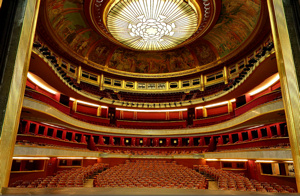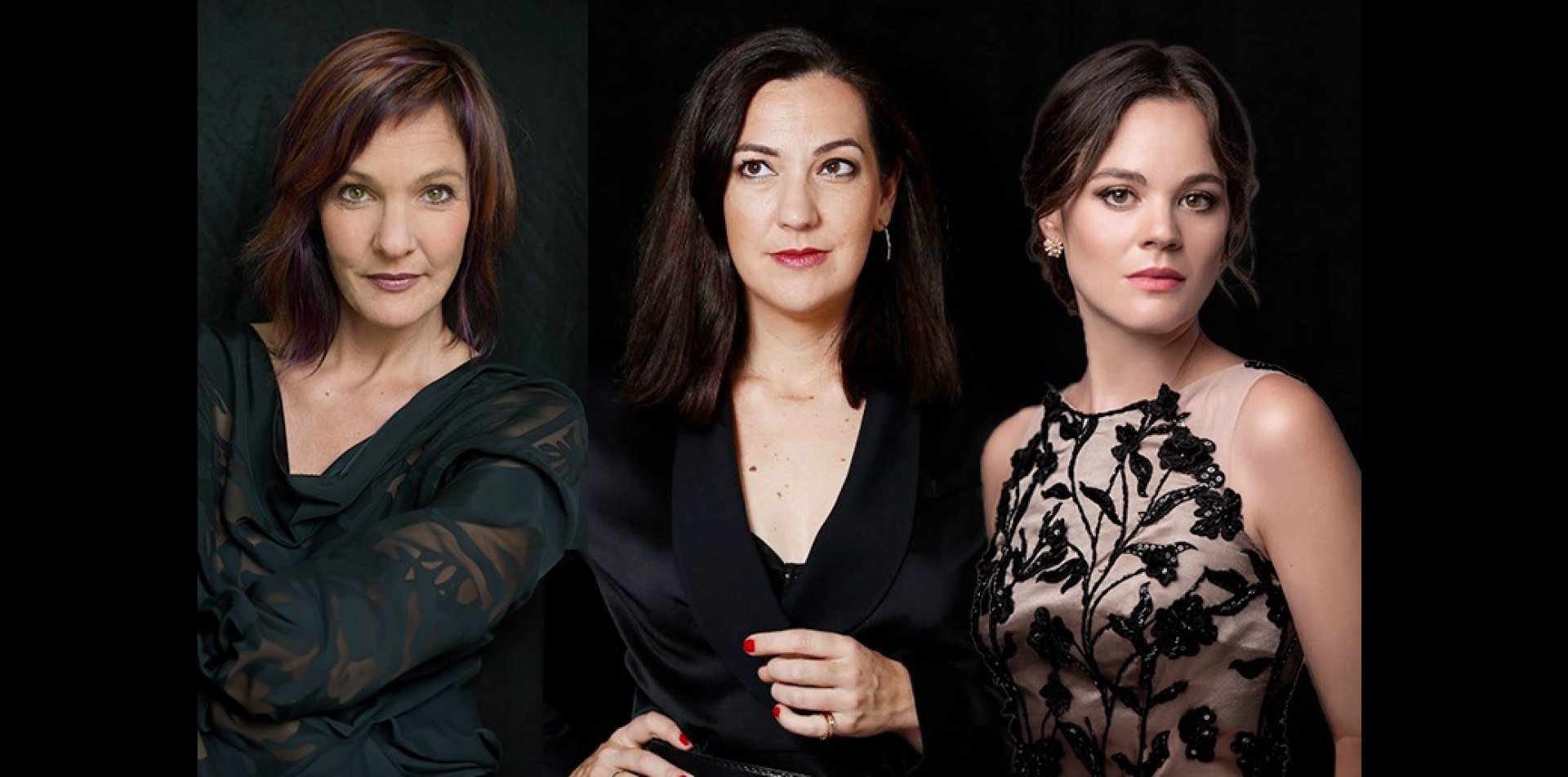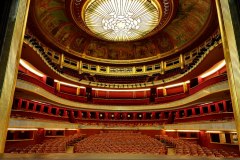Der Rosenkavalier
Mo | Tu | We | Th | Fr | Sa | Su |
Although we know that Gabriel Astruc originally intended to present Der Rosenkavalier at the opening season of the Théâtre in 1913, it fell foul of the founder’s lavishly expensive programming and he was ultimately forced to abandon the idea. It was not performed until 1937, by the Berlin Opera conducted by Clemens Kraus and featuring Viorica Ursuleac, one of the composer’s favourite singers, as the Marchioness. This work marked a turning point in Strauss’s career. After the “odysseys and rages” of Salome and Elektra, Der Rosenkavalier was return to the Viennese tradition of character opera. Originally, the Marchioness, whom Octavian deserted in favour of Sophie, only had a small role, but it gradually expanded into such a major part that she is present throughout Act One and dominates the entire opera, even in her absence. There has been a shift from the light-hearted comedy of manners to a meditation on time and the ephemeral nature of feelings. Der Rosenkavalier embodies the moral disarray of an era which was drawing to a close behind the superficial smiles and impeccable manners. A few decades later, Capriccio would adopt the same nostalgic approach to the eighteenth century, which was the musician’s Olympus. Krzysztof Warlikowski is sure to bring his unique dramatic vision to this masterpiece of twentieth-century opera repertoire and the Orchestre National de France under the baton of Henrik Nánási will do full credit to Strauss’s sumptuous colours.
Synopsis
Time: 1740s, in the first years of the reign of Empress Maria Theresa
Place: Vienna
Act 1
The Marschallin's bedroom
The opera's Einleitung (Introduction) depicts a night of lovemaking between Princess Marie Therese von Werdenberg (known as the Marschallin, the title given to a Field Marshal's wife) and her much younger lover, Count Octavian Rofrano. The curtain rises to show them lounging in bed together just before daybreak ("Wie du warst! Wie du bist"). Loud voices are soon heard outside, and the Marschallin has Octavian hide, believing that her husband has returned early from a hunting trip. Octavian emerges in a skirt and bonnet ("Befehl'n fürstli' Gnad'n, i bin halt noch nit recht...") and tries to sneak away, but the Marschallin's country cousin, Baron Ochs auf Lerchenau, bursts in through the same door.
The Baron is newly engaged to Sophie Faninal ("Selbstverständlich empfängt mich Ihro Gnaden"), a wealthy merchant's daughter. This does not keep him from making lewd comments at the disguised Octavian. Ochs has come to ask two favors: he wants to borrow his cousin's notary to write the marriage contract, and he wants her to recommend a young nobleman to serve as his Rosenkavalier ("Knight of the Rose"), who will deliver the traditional silver engagement rose to Sophie. The Marschallin instructs "Mariandel" to fetch Octavian's miniature portrait and present it to the Baron. Ochs readily accepts Octavian as his Rosenkavalier, deciding that the "maid" must be that young count's "bastard sister", then insists that the Marschallin allow "Mariandel" to come and work for his new bride. She refuses as politely as possible and finally dismisses the "maid".
A busy reception scene ensues as the room fills with vendors and supplicants to the Marschallin ("Drei arme adelige Waisen"), who ignores the former and aids the latter. A tenor sent by the Portuguese ambassador serenades her ("Di rigori armato") while Ochs sits down with the notary. Two Italian intriguers, Valzacchi and Annina, present scandal sheets for sale, which the Marschallin coldly declines. Ochs tries to stipulate a gift from Sophie's family consisting of all their properties, free from mortgages, and quickly loses patience with the notary's attempts to explain that this is illegal. Amid all the activity, the Marschallin remarks to her hairdresser: "My dear Hippolyte, today you have made me look like an old woman" ("Mein lieber Hippolyte"). This so disturbs her that she orders the room to be emptied. As the people file out, Valzacchi and Annina offer Ochs their spying services. He asks whether they know anything about "Mariandel"; they lie and claim to know all about her.
Now alone, the Marschallin ponders her waning youth and the unhappiness of her forced marriage, perceiving the same in store for Sophie ("Da geht er hin..."). Octavian returns, dressed again in men's clothes ("Ach, du bist wieder da"). When he sees that the Marschallin is out of sorts, he assumes it is from her earlier fear that he might have been discovered. But she is still thinking of the passage of time (a clock is heard chiming 13 times) and tells him that, very soon, he will leave her for someone younger and prettier. Octavian reacts with frustration, and the Marschallin turns him away. Too late, she realizes that she has neglected to kiss him goodbye. With nothing else to be done, she summons her young page, Mohammed, to take the silver rose to Octavian, then stares pensively into her hand mirror (or similar) as the curtain falls.
Act 2
The von Faninals' palace
The next day, Herr von Faninal exultantly and Sophie nervously await the Rosenkavalier's arrival ("Ein ernster Tag, ein grosser Tag!"). Following tradition, Faninal departs before the Knight appears, saying that he will return with the bridegroom. Sophie prays to keep her sense of humility through all the rapid changes happening in her life, but she is repeatedly interrupted by her duenna, Marianne, who reports from the window on the Rosenkavalier's elaborate entourage ("In dieser feierlichen Stunde der Prüfung"). Octavian arrives with great pomp, dressed all in silver, and presents the silver rose to Sophie ("Mir ist die Ehre widerfahren..."). She smells it, saying it is as sweet as a greeting from Heaven itself. Instantly smitten, Octavian joins her avowal that they will remember this moment until death.
They settle into a chaperoned conversation. Sophie reveals that she already knows Octavian's full name – Octavian Maria Ehrenreich Bonaventura Fernand Hyacinth Rofrano – from studying the catalogue of Austrian nobility to prepare for her marriage. She even knows his nickname, Quinquin, which only intimate friends (including the Marschallin) call him. She adds that she likes him very much. Ochs then enters with Faninal ("Jetzt aber kommt mein Herr Zukünftiger") and wastes no time revealing his character to the bride, loudly examining Sophie's body and comparing her to "an unbroken filly" when she protests. Once he leaves the room with Faninal to finalize the marriage contract, Sophie and Octavian quickly agree that she will not marry the Baron under any circumstances.
The young lovers' rapturous duet ("Mit Ihren Augen voll Tränen") is soon interrupted by Valzacchi and Annina, who surprise them and call for Ochs. Octavian challenges the Baron to a duel. Ochs runs forward, scratches his arm on the point of Octavian's drawn sword, and screams so that Faninal and the rest of the household come rushing in. Sophie begs her father to call off the wedding, to no avail: Octavian is asked to leave, and Sophie is sent to her room. Ochs is left on the divan, his arm in a sling, nursing a bottle of Hippocras and fantasies of revenge against Octavian. But Annina brings him something that raises his spirits much more quickly: a letter signed by "Mariandel", asking for a tryst. At this, Ochs forgets his sling and waltzes across the stage, ignoring Annina's hints for a tip – and missing her quiet promise to get even ("Da lieg' ich!").
Act 3
A private room in a shabby inn
Fed up with the Baron, Valzacchi and Annina help Octavian prepare a trap the next evening. Elaborate preparations are seen in pantomime before Ochs arrives with "Mariandel", ready for a cozy dinner at a table set for two.
Ochs is disturbed by "Mariandel's" uncanny resemblance to his nemesis Octavian, and keeps catching glimpses of strange apparitions in the room. A disguised Annina bursts in, calling Ochs her husband and the father of her (numerous) children, who crowd around him, crying, "Papa! Papa!" The Baron calls for the police; to his unpleasant surprise, the vice squad treats him with suspicion, and Valzacchi claims not to know him. The police inspector asks about the "woman" accompanying him, and Ochs lies that "she" is his fiancée, Sophie Faninal – just in time for Herr von Faninal to arrive, demanding to know why Ochs's messenger (presumably Valzacchi) has summoned him to this disreputable place. When asked if "Mariandel" is his daughter, Faninal retorts in a rage that his daughter is outside. Sophie enters, confirming this assertion, and her apoplectic father staggers out, leaning on her shoulder.
"Mariandel" now offers to make a statement in private, and retires behind a screen with the Police Inspector. Soon Ochs sees articles of women's clothing coming into view. He rages against the vice squad, but is interrupted by the Marschallin's arrival. The Police Inspector greets her before clearing the room, and she explains to the Baron that he has been fooled. Sophie returns and tells Ochs that their engagement is off; Octavian emerges, and the Marschallin confirms that Octavian, Valzacchi, Annina, and others set up a "masquerade" to break his engagement. Ochs, glancing back and forth between Octavian and the Marschallin, now grasps the nature of their relationship and implies that he may tell the Marschallin's husband of it, but he is cowed by the Marschallin's force of will (if not the sight of Octavian's sword) and ingloriously departs, pursued by children and bill collectors.
The Marschallin, Sophie, and Octavian are left alone, and Octavian does not know what to do. The Marschallin introduces herself to Sophie, recognizing that the day she feared has come (Trio: "Marie Theres'!" / "Hab' mir's gelobt"), and releases Octavian to be with the woman he loves. She then withdraws, with a promise to Sophie that she will offer Faninal a face-saving ride home in her carriage. As soon as she is gone, Sophie and Octavian run to each other. Faninal and the Marschallin return to find them locked in an embrace. With a last, bittersweet look toward her lost lover, the Marschallin heads for the carriage with Faninal. Sophie and Octavian follow after another brief but ecstatic love duet ("Ist ein Traum" / "Spür' nur dich"). The opera ends with Mohammed trotting in to retrieve Sophie's dropped handkerchief, then racing out again after the others.
Program and cast
Sung in German, with French and English subtitles
Henrik Nánási | direction
Krzysztof Warlikowski | staging
Małgorzata Szczęśniak | scenography, costumes
Claude Bardouil | choreography
Felice Ross | lights
Kamil Polak | video
Marlis Petersen | The Marschallin
Marina Viotti | Octavian
Regula Mühlemann | Sophie
Peter Rose | Baron Ochs auf Lerchenau
Jean-Sébastien Bou | Herr von Faninal
Eléonore Pancrazi | Annina
Krešimir Špicer | Valzacchi
Francesco Demuro | An Italian singer
Laurène Paternò | Marianne
Florent Karrer | A police inspector / A notary
François Piolino | The Marschallin's Major-Domo / Faninal's Major-Domo
Yoann Le Lan | An innkeeper
Orchestre National de France
Chœur Unikanti, Maîtrise des Hauts-de-Seine | direction Gaël Darchen
Théâtre des Champs-Élysées

The Théâtre des Champs- Elysées is undoubtedly one of the finest venues in Paris . Built in 1913 , it has the distinction of having been designed by a group of artists architects Henry Van de Velde and Auguste Perret , the painter and sculptor Antoine Bourdelle , the painter Maurice Denis , and the crystal- René Lalique to do mention the main ones . He was the first Parisian theater to be built entirely of reinforced concrete.
Restoration of the Great Hall devoted to operatic performances , symphony concerts and dance was decided in 1985. Two years later , on 23 September 1987, the theater reopened its doors , completely renovated. Fifteen years after this important work it was decided to undertake a new renovation campaign , but to prevent the complete closure of the theater for an entire season , work is now carried by step during the summer . Then it is to replace aging equipment , to remedy wear certain parts of the theater and improve spectator comfort and artists during their visit . Thus in recent years, including the work involved the renovation of marble facade, replacing the carpet in the room with wooden floors , installation of a new fully decorated wooden concert to a significant improvement of acoustics, the orchestra pit and stage below .
The Théâtre des Champs- Elysées is now a modern working tool receiving each year nearly 300,000 spectators and a few thousands of artists and collaborators.
The Théâtre des Champs- Elysées , the jewel of French architecture of the twentieth century, was in 1953 one of the first buildings of contemporary architectural heritage to be classified as historic monuments . Since 1970 the Caisse des Dépôts owns the entire building 15 avenue Montaigne and principal patron of the theater.
For over a century, Théâtre des Champs-Elysées has been the place where the most celebrated artists have come to make their names in Paris. The world’s finest orchestras and world-class soloists have always been a fixture at the Theatre. Théâtre des Champs-Elysées presents more than 200 concerts each year and is renowned for its outstanding performances of all genres, from classical music concerts and staged opera to contemporary dance and jazz.
How to reach us:
Subway: Alma-Marceau (line 9), Franklin D.Roosevelt (line 1), Pont de l’Alma (RER line C)
Bus: n° 42, 63, 72, 80, 92
Taxi station: Place de l’Alma, corner of avenue George V
Car park: Alma George V. The entrance is in front of n° 19, avenue George V
Fixed rate depending on the length of the performance. Payment upon entering.

 EN
EN DE
DE IT
IT FR
FR ES
ES RU
RU JP
JP RO
RO
 Seating plan
Seating plan 